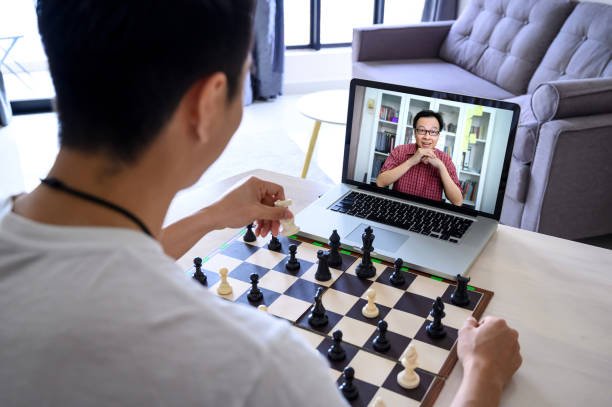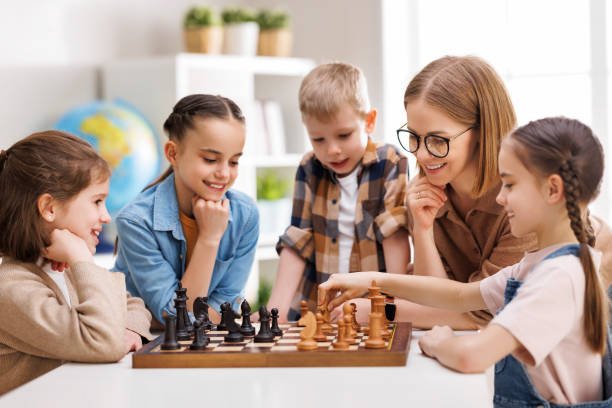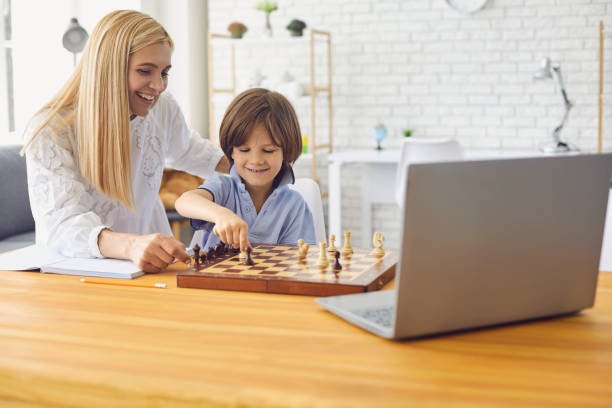Lincoln Park is one of Chicago’s most vibrant neighborhoods. With its tree-lined streets, family-friendly atmosphere, and deep appreciation for education, it’s the kind of place where parents want their children to not just do well in school, but also develop skills that last a lifetime.
One of the best ways to build those skills is through chess. This game, loved around the world, is more than just moving pieces on a board—it’s a way to teach focus, patience, problem-solving, and creative thinking. These are lessons that serve children well far beyond the chessboard.
If you’re a parent in Lincoln Park, you might already know that there are some chess clubs and coaches in and around Chicago. But the real question is: Which type of training will give my child the best results? While traditional in-person lessons have their place, more and more families are discovering that structured, high-quality online chess training can accelerate learning and keep kids excited to play.
Online Chess Training
Online chess training has transformed the way students learn the game. For families in Lincoln Park, it removes many of the obstacles that come with traditional lessons while adding features that make progress faster and more exciting.
Instead of rushing through traffic to reach a club or worrying about missed classes, students can log in from home and still receive world-class instruction.
The biggest strength of online chess learning is that it combines structure with flexibility. A good online program doesn’t just throw random lessons at students. It follows a clear path, starting with the basics and building toward advanced strategies in a way that feels natural and achievable.
Students know exactly where they are and what’s coming next.

In live online sessions, learning is interactive. Students can ask questions, solve puzzles together, and analyze real games with their coaches in real time. The tools available—digital boards, replay features, game analysis software—make it easy to see mistakes, learn from them, and apply new ideas immediately.
Another huge advantage is access to a global chess community. A child in Lincoln Park can play a practice game against someone in California in the morning and review a strategy with a coach in Europe that same evening. This variety of opponents helps them adapt to different playing styles, which is critical for growth.
Many parents also notice that online training can help children feel more confident. At home, they’re in a comfortable setting, and they can focus fully without the noise or distractions that sometimes come with large, crowded clubs.
When done right, online chess training isn’t just a replacement for in-person learning—it’s a better, more effective way to master the game.
Landscape of Chess Training in Lincoln Park, Chicago and Why Online Chess Training is the Right Choice
Lincoln Park is a neighborhood that values intellectual growth. You’ll find chess being played in parks, coffee shops, libraries, and some schools. There are a few in-person coaches and small clubs in the area, plus bigger chess organizations in other parts of Chicago.
While these local programs can be a good introduction to chess, they often lack a consistent structure. A school club might meet only once a week, and a local tutor may not follow a long-term curriculum. This means progress can be slow, especially for students who are ready to learn more quickly.
Online chess training solves these issues. Students can learn more often, review lessons anytime, and progress through a well-planned learning path. Every game they play online can be recorded, analyzed, and discussed in their next class. This level of tracking simply isn’t possible in most in-person setups.
In a neighborhood like Lincoln Park—where parents expect quality education—online training offers exactly that. It’s flexible enough to fit into busy schedules but structured enough to produce real, measurable results.
How Debsie is The Best Choice When It Comes to Chess Training in Lincoln Park, Chicago
Debsie isn’t just an online chess academy—it’s a carefully designed learning experience that puts the student at the center of everything. From day one, we focus on understanding each child’s current skills, confidence level, and learning style. This helps us place them in a class that’s the perfect fit—not too simple, not too overwhelming.
Our lessons are live, small-group sessions where every student is noticed and supported. Coaches call students by name, ask them to explain their thinking, and guide them step-by-step through positions and puzzles. Learning is active, not passive, and students quickly see how their decisions on the board affect the outcome of a game.
We follow a clear, structured curriculum that ensures steady growth. Beginners work through piece movement, basic checkmates, and opening principles. Intermediate students tackle tactics, middlegame planning, and positional play.
Advanced players learn deep endgames, advanced strategy, and tournament preparation. Each stage builds on the last, so there are no gaps in learning.
Our FIDE-certified coaches are both skilled players and experienced teachers. They know how to make even the most complex concepts simple and enjoyable. They also keep lessons engaging with interactive boards, real-game examples, and challenges that push students to think creatively.
Every two weeks, we run online tournaments for our students. These aren’t just competitions—they’re opportunities to test new skills in a safe, encouraging environment. Students learn to manage their time, stay calm under pressure, and adapt to different opponents.
Parents stay fully informed through regular progress updates, so they always know what their child is learning, where they’re improving, and what’s next in their journey. And with our flexible scheduling, no lesson is ever lost to bad weather, traffic, or travel.
👉 Book your free trial class here

Offline Chess Training
Offline chess training is the traditional way many people learned the game—face-to-face with a coach, playing across a real board, and physically moving the pieces. In Lincoln Park, this often takes place in community centers, libraries, after-school programs, or small private studios. For some families, there’s a nostalgic value in seeing the pieces on the table and hearing the click of the chess clock.
In-person lessons can offer a strong sense of community. Students meet other players, share laughs between matches, and form friendships over a shared love of the game. Younger players especially may enjoy the social element of sitting at a table with their peers.
However, offline chess training often depends heavily on the individual coach’s style and availability. Some coaches follow a structured plan, but others decide the lesson on the spot, which can make progress inconsistent.
Students might spend one session playing casual games without feedback, then jump to a famous grandmaster match the next week, without a clear connection between lessons.
Another limitation is the variety of opponents. In a small local group, a student may face the same two or three players repeatedly. While this can help them learn specific patterns, it does little to prepare them for the wide range of strategies they’ll see in bigger competitions or online play.
Logistics can also be a challenge. Bad weather, transportation delays, or schedule conflicts can easily cause missed classes. Once missed, those lessons are rarely rescheduled, and the break in momentum can slow improvement.
Offline training can certainly be enjoyable and beneficial in some ways, but when compared to the structured, flexible, and globally connected approach of online training, it often falls short for students who want consistent, measurable progress.
Drawbacks of Offline Chess Training
While offline chess training has its charm, for many students in Lincoln Park it struggles to deliver the steady, long-term progress that parents expect. One of the most significant challenges is the lack of a consistent, structured curriculum.
Without a defined plan, lessons can become random—covering an opening one week, a tactical puzzle the next, and casual games the week after. This scattered approach can leave important concepts unlearned and make improvement slower than it should be.
Another issue is uneven attention in group settings. In a class of ten or more students, it’s easy for a child to go unnoticed. More advanced players might dominate the coach’s time, leaving newer or quieter students without the guidance they need. Over time, this can lead to frustration and a loss of interest.
Feedback is also limited in offline training. Without digital game records, it’s hard to revisit past mistakes in detail. A student might keep making the same positional error for weeks without realizing it, simply because the coach didn’t catch it in the moment or had no way to review the game afterward.

Consistency is another challenge. Life happens—coaches cancel, families travel, the weather turns bad. Missed lessons often can’t be made up, and in chess, every missed week can slow the momentum that’s essential for growth.
Finally, there’s a limited pool of opponents. Playing against the same small group over and over teaches students how to handle those players, but not how to adapt to different styles. This can be a big disadvantage when they step into a larger tournament or play online.
These drawbacks highlight why many Lincoln Park families are choosing online-first academies like Debsie. With a clear structure, real-time feedback, flexible scheduling, and access to a worldwide network of players, online training removes these barriers and helps students progress faster and more confidently.
Best Chess Academies in Lincoln Park, Chicago, Illinois
Lincoln Park offers a few ways for children and adults to get into chess, but the options vary greatly in structure, quality, and accessibility. While some focus on casual play, others aim to prepare students for competitive success. Among them, Debsie stands out as the most complete and effective option for long-term growth.
1. Debsie
Debsie is more than an online chess academy—it’s a carefully crafted training system designed to make learning chess engaging, structured, and effective for every student. We start with a personal assessment, understanding exactly where each child stands and where they want to go. This ensures that every student begins at the right level and progresses at a pace that’s challenging but never overwhelming.
Our live, interactive classes are small enough to give every student individual attention. Coaches don’t just lecture—they ask questions, encourage students to explain their reasoning, and guide them to find the best moves themselves. This active participation builds confidence and deep understanding.
The curriculum is fully structured, moving students from the basics of board setup and checkmates to advanced tournament strategies. Beginners build a strong foundation, intermediates sharpen their tactics and positional play, and advanced players learn the high-level skills needed to compete successfully.
Debsie’s FIDE-certified coaches are experts at both playing and teaching. They simplify complex strategies, keep lessons engaging, and know how to adjust their approach for different learning styles.
Our bi-weekly online tournaments give students a safe, supportive environment to put their skills into practice. They learn how to handle time pressure, adapt to different opponents, and build resilience through both wins and losses.
Parents receive regular progress reports so they always know what their child is learning and where they’re improving. With flexible scheduling and no travel time, consistency is easy to maintain—even for busy families.
2. Chicago Chess Center
The Chicago Chess Center offers in-person lessons, casual play nights, and tournaments. It’s a good choice for students who want to participate in local over-the-board events, but it doesn’t provide the same flexible, structured, and progress-focused approach that Debsie offers online.
3. Renaissance Knights Chess Foundation
The Renaissance Knights program promotes chess in schools and community centers around Chicago. While it’s great for introducing chess to beginners, the instruction often depends on location and availability, and it may lack the consistent one-on-one feedback that accelerates improvement.
4. Private Tutors in Chicago
Some families in Lincoln Park hire private tutors for personal chess lessons. This can be effective if the tutor is experienced and follows a set plan. However, quality varies greatly, and without a global network of opponents or tournaments, students can miss out on broader competitive exposure.
5. Online Platforms like Chess.com and Lichess
Websites like Chess.com and Lichess offer puzzles, lessons, and the ability to play opponents worldwide. They’re valuable tools, but without a dedicated coach to guide progress and correct mistakes, many students plateau or develop poor habits.
Why Online Chess Training is The Future
Education as a whole is moving toward blended and digital-first models, and chess training is no exception. For families in Lincoln Park, online chess training has become not just a convenient alternative, but a superior choice in many ways.
The first big reason is access to expertise. In the past, a student’s options were limited to whoever happened to be teaching nearby. Now, with online programs, a child in Lincoln Park can learn from a FIDE-certified coach on the other side of the world—someone who might specialize in their exact level or style of play. This means no compromise on quality.

The second reason is consistent structure. Good online programs have a curriculum that’s been tested and refined, so students move forward step-by-step. This eliminates the randomness that often happens in casual or unstructured offline classes. Every lesson builds on the previous one, ensuring no gaps in understanding.
Online training also offers flexibility that offline programs can’t match. Busy families can choose from multiple class times, make up missed sessions, and even watch recordings of lessons if needed. This consistency is key to building lasting skills.
Another reason is global exposure. In online tournaments, students face opponents from different countries, with different playing styles and strategies. This variety helps them adapt quickly, think creatively, and avoid being caught off guard in competitions.
For chess academies, online platforms allow them to reach more students, attract the best coaches, and run events without the limits of physical space. This scalability means they can invest more in tools, technology, and teaching methods—directly benefiting every student.
Simply put, the future of chess training is online. It’s faster, smarter, and more adaptable to the needs of modern students and families. And in that future, Debsie is already setting the standard.
How Debsie Leads the Online Chess Training Landscape
While many programs are only now trying to adapt to online teaching, Debsie was built with it in mind from the very beginning. Every detail—from the way lessons are planned to how progress is tracked—has been designed to make online learning more personal, engaging, and effective than any traditional setup.
When a new student joins Debsie, we begin with a personal skill assessment. This isn’t just about figuring out whether they’re a beginner or advanced—it’s about understanding how they think, how they learn, and what motivates them.
This insight allows us to place them in the right class immediately, so they can start making progress from day one.
Our live, small-group classes give every child the chance to participate fully. Coaches ask questions, encourage discussion, and walk students through moves in real time. Every lesson is active, not passive. Students learn by thinking, explaining, and making decisions—not just by listening.
The curriculum is mapped out for long-term growth. No skipping steps, no random topics. Every stage—beginner, intermediate, and advanced—has a clear path forward. And because lessons are online, they can be supported with interactive tools, replay features, and game analysis software that make learning more dynamic.

Debsie also runs exclusive online tournaments twice a month. These are carefully moderated to ensure a positive experience, and they give students valuable match experience against peers from around the world. They learn to handle pressure, adapt to unfamiliar strategies, and think quickly under time constraints.
Parents love our progress reports, which break down what their child has learned, how they’ve improved, and what’s next. This level of transparency builds trust and keeps families engaged in the learning journey.
We don’t just keep up with trends—we set them. Our approach to online chess training blends world-class coaching, advanced tools, and a global community into a single, powerful program.
👉 Book your free trial class here
Conclusion
Lincoln Park is full of opportunities for children to learn, grow, and challenge themselves. But when it comes to chess, the right training can make all the difference between casual play and real, lasting skill. While local clubs and tutors can be a good starting point, they often lack the consistency, structure, and global exposure that modern learners need.
That’s why families here are turning to Debsie. With a clear learning path, small interactive classes, FIDE-certified coaches, and worldwide tournaments, we give students more than just lessons—we give them the tools to think smarter, stay focused, and solve problems with confidence.
Your child could spend years learning in bits and pieces, or they could start making measurable progress from day one. The choice is simple.
Other Comparisons of Best Chess Classes All Across The US:




